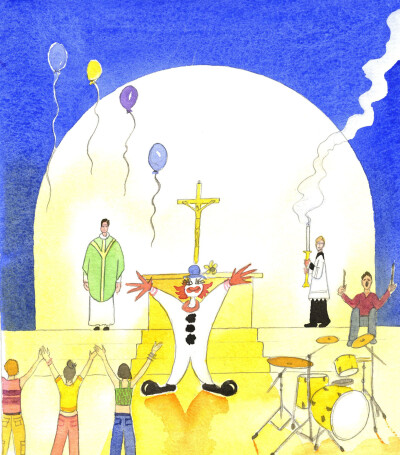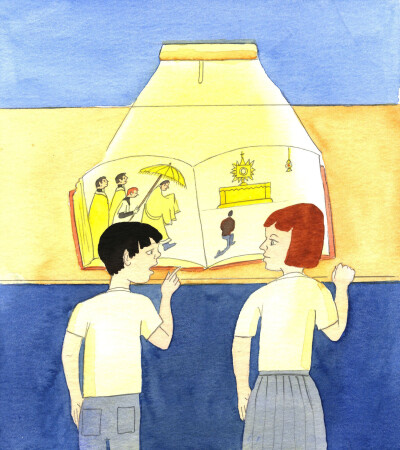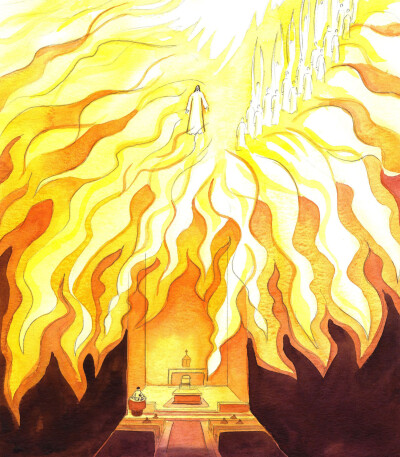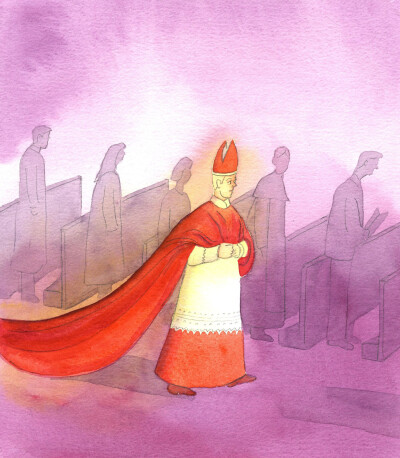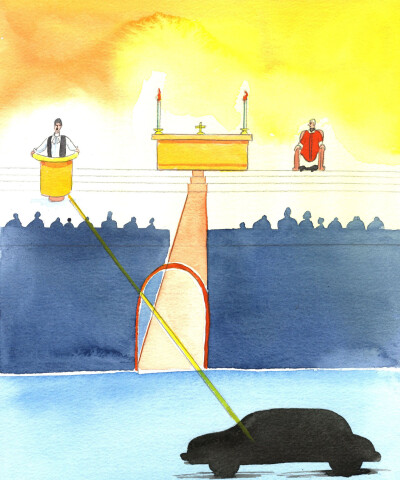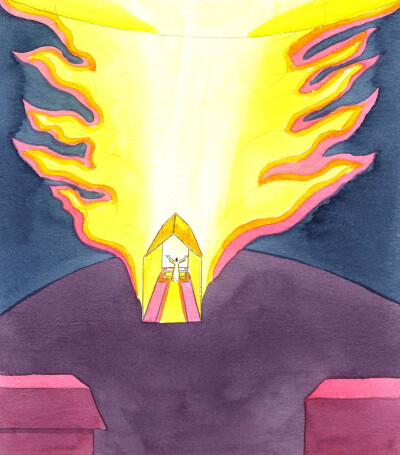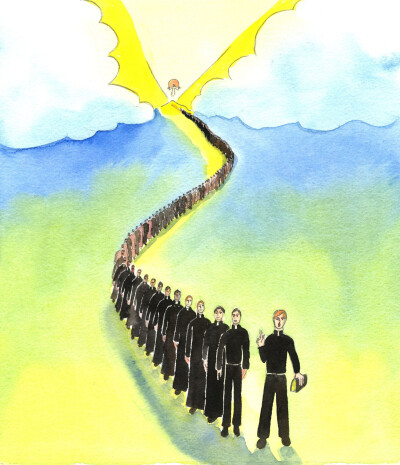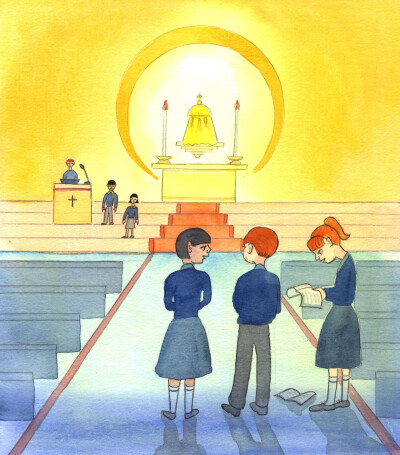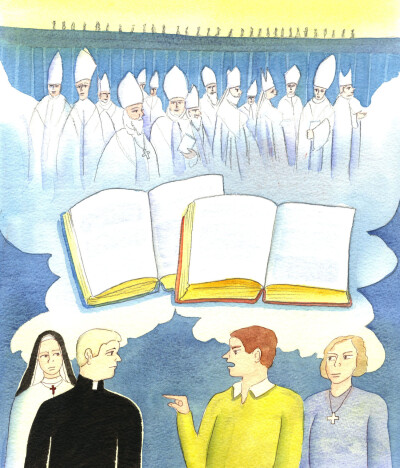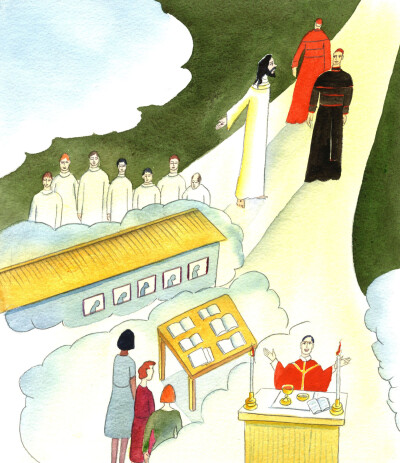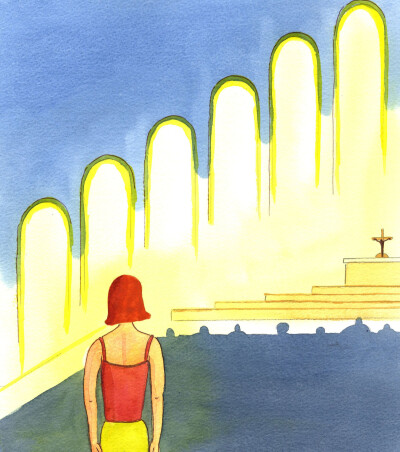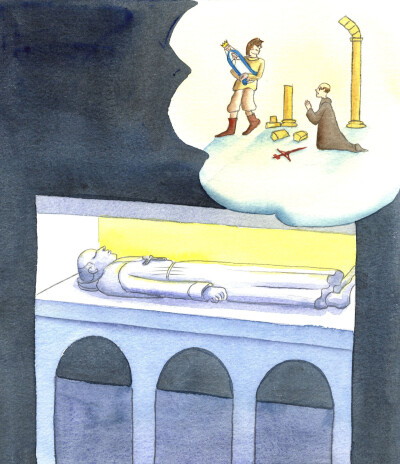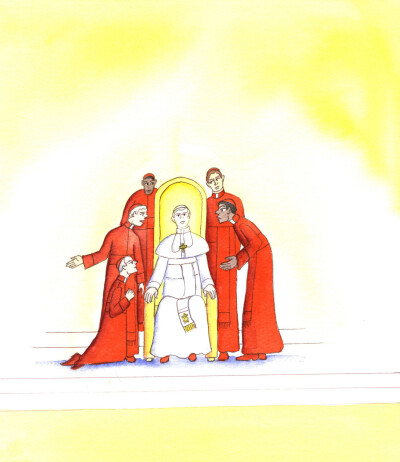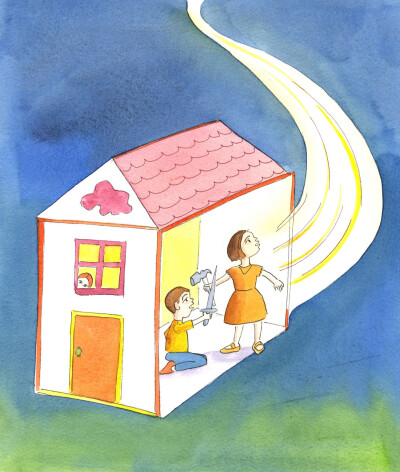Search Page
Showing 21 - 40 of 50
There is no need for irreverent liturgies to be offered to youngsters, in the hope of sparking an interest in religion. It is better, in Christ's sight, to prepare joyful social events for them, followed by thorough catechesis, and opportunities for Reconciliation. Then there can be a beautiful inspiring Mass, or Adoration and Benediction.
It is a tragedy that two generations of Catholics have not learned, in their homes or schools or churches, the importance of kneeling for prayer and of showing reverence to Christ by genuflection and by attendance at Benediction. It is also sad that many have never seen or taken part in a Eucharistic Procession.
Through the Liturgy, if we are prayerful, contrite and obedient to Christ, the Father can lift us closer to Heaven
The living God is a 'Holy Fire', blazing with love in our sanctuary, it seems, as we gather to offer Him honour and praise in His house of prayer, through the Holy Mysteries. Christ is Present; with His Angels and Saints, enfolded in the glory of the Father: glory into which we hope to plunge at death, having been purified in the Sacred Liturgy. Our reverent attention should be drawn towards God, for Whose glory this Church was built.
When St. Augustine came to England in 597 AD, he came because he had been sent by the Pope. No Christian, in any era, acts wisely, if he ignores the Pope, and the constant teaching of the Pope and the other Catholic Bishops on matters of faith and morals, or ignores their guidance about discipline, the liturgy, and other matters.
People do not please Christ by their complaints about traditional garments for the Bishops, or about beautiful furnishings which adorn many of our churches. These are for the Glory of God, the dignity of the occasion - the Sacred Liturgy - and the nobility of the Sacred Ministry, not in order to draw attention to individuals but to their sacred office.
It is unwise for Catholic Clergy to suggest 'pulpit exchanges' with other Christian leaders. When Catholic lay-persons, quite rightly, are not allowed to preach during the Sacred Liturgy, it is hardly fitting for a Protestant to do so, who is not in full Communion with the Church and does not share all of her teachings - nor does he have valid orders.
The Scared Liturgy is prayer offered by Christ, in the power and light of the Holy Spirit to the Father Who reigns in Heaven. No other praise can surpass the praise which Christ offers from the heart of our Church - especially the Holy Sacrifice of the Mass. To pray at Mass is to pray in Spirit and in truth. We pray in the power of Spirit, through Christ Who is the truth of God. God invites the whole world to prefer this sacrificial, sublime prayer to all of their own ideas, methods or idols.
Since Christ ascended to Heaven, having asked His disciples to hand on His message, the Clergy have taught the truth all over the world, instructing people, handing on the Deposit of faith; so it is a disastrous aberration, when an individual priest choses to hand on a distorted Faith, or waters it down, or omits what is important to make it more palatable to sinners who want to continue in their sins. Language changes, but not truth. There is no room for 'creativity' in dogma, or in Liturgy.
Those Who encourage children to take a busy part doing 'jobs' during the Sacred Liturgy might make the children feel important but often lead them to become distracted from what is said, and certainly not prayerful. There should be encouragement, rather, for children to know what happens in the Holy Sacrifice, to believe it, to be grateful for God's love and action, and to adore and praise Him.
The Church was badly damaged by changes, events, opinions and foolish decisions that followed the Second Vatican Council, and by misinterpretations of Council documents on catechesis, evangelisation, the Sacred Liturgy and Ecumenism. The Lord has acted, for example through some of the New Movements, to mend the damage, and to restore faith in the constant teachings of the Church.
When a new Bishop is appointed, he should know what his Master, Christ, is inviting Him to examine, as he begins his care of a new Diocese. The Bishop will ask about his priests, and their well-being. He will look at the Seminary, and its training. He will ensure that catechesis is well-organised, orthodox and wholehearted; and he will see whether the Sacred Liturgy is celebrated in a way which gives glory to God, and every possible help for the education and salvation of souls.
There exists in the Church widespread ignorance about reverence. It is a cause for sadness when a woman appears in church for the Sacred Liturgy whilst bare-shouldered, and showing no concern for the people who will be distracted by her appearance. She might not be entirely to blame; but in her immodesty she shows little respect for her all-holy Creator to Whom all worship is directed.
The history of the Catholic Church is one of struggle, then joy. Christ asks us all to be hopeful, no matter how dire the problems we see in the Church in our era. Some people in past ages have gone to their deaths, not knowing how a terrible crisis would be overcome, for example, at the Reformation, in England, and more recently in the chaos following the Second Vatican Council. But there will soon be great improvements in the Sacred Liturgy, and then in Catechesis.
Bishops are appointed to teach, and to lead the Church in prayer. When the Pope's advisors are discussing which men might be appointed as Bishops, it is not enough for anyone to say that a certain man is very 'pastoral', if he is not also doctrinally-sound in his beliefs, and fervent in ensuring the reverent conduct of the Sacred Liturgy.
It is good that the Pope is advised by a group of colleagues as he chooses men to be Bishops. It is not enough for men to be known as good 'pastoral' men, if they are unsound on doctrine or lack concern for the reverent conduct of the Sacred Liturgy.
Just as in a childrens' play-house there can arise nasty squabbles, and an adult has to swoop down to help the children to see reason, so in the Church, our joy can be spoiled by squabbles about doctrine or Liturgy, especially when the truth offered by those in authority is ignored; and so God swoops down from time to time, to help, by means of an inspiring vision, or a message, or a new call to penance, or a new gift of encouragement for the Church.
It is only reasonable to believe the evidence of our eyes and ears. If we saw blood flowing in a gutter, we would search the road for an injured body, and would find it. If we see plain evidence that hundreds of thousands of Catholics have abandoned their vocations, or left the Church, we are sensible if we look back, to find the cause. It lies in the aftermath of the Second Vatican Council, in the exaggeration, rebellion, dissent, and selfishness that cause traditional teaching and liturgy to be despised.
How to know Jesus Christ
Finding Christ, Finding Life: a talk by Elizabeth Wang, given at the French Church, Leicester Square, London, 2006.
INTRODUCTION.
You probably know that I’m an artist. The project I’m busy with,…
Holiness, by Elizabeth Wang
This text is the complete version of the pamphlet entitled 'SPEAK ABOUT HOLINESS'. It is based on a talk given by Elizabeth Wang.
Preface.
This little book contains the full version of the text I …
Showing 21 - 40 of 50

